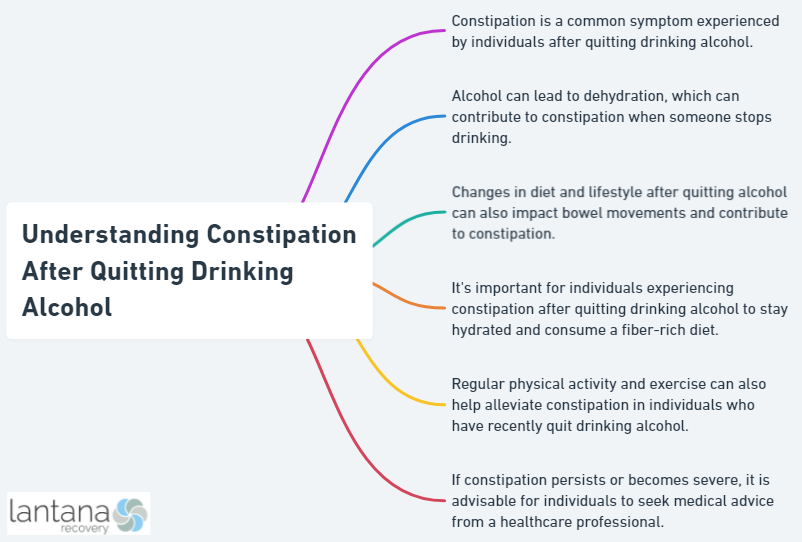Ever wondered why your bathroom routine seems a bit off after you’ve sworn off the bottle? You’re not alone. Many people experience constipation after quitting drinking alcohol, an issue that’s common yet rarely discussed. But why does it happen? Buckle up, as we’re about to dive deep into the world of gut health, alcohol, and the mysterious connection they share.
Short Summary
-
Quitting alcohol can lead to constipation, but staying hydrated and eating a fiber-rich diet is key for regular digestion.
-
Be aware of the symptoms of Alcohol Withdrawal Syndrome and seek medical help if necessary.
-
Long term excessive drinking increases your risk of serious health issues, stay motivated to make healthy choices!
The Link Between Alcohol and Constipation
Remember those times when a few too many drinks resulted in an unpleasant date with the toilet the next day? Alcohol consumption can wreak havoc on our digestive system, leading to changes in bowel movements and, you guessed it, constipation. How does it do it?
Alcohol is a diuretic, which means it promotes increased urine production. Frequent urination can lead to dehydration, as the body loses more water than usual. Dehydration can result in dry and hardened stools, making them difficult to pass through the intestines, leading to constipation.
The link between alcohol and constipation becomes even more complex when we consider alcohol withdrawal, which can also affect the digestive system. Consider the alcohol you sip as a double-edged sword. On one hand, it can invigorate your social life, but on the other hand, it can lead to dehydration, which can in turn result in constipation.
The key to avoiding the uncomfortable grip of constipation while still enjoying your favorite beverage? Hydrating yourself! Yes, having a hydrating beverage alongside your alcohol can help avoid dehydration and gastrointestinal upset.
Dehydration and Hormonal Imbalance
We’ve all heard the advice to drink water between alcoholic beverages, but why exactly is that? The answer lies in how alcohol can lead to dehydration, a common culprit behind constipation. Alcohol is like a puppet master, controlling how your body absorbs and retains water, leading to changes in bowel movements that can result in constipation. If you’re a heavy drinker, severe symptoms of constipation may become an unwelcome guest if alcohol consumption is not moderated.
Alcohol also plays a role in the hormonal balance in our bodies. Alcohol suppresses the release of vasopressin, a hormone that plays a key role in controlling water retention in the body. Imagine vasopressin as a diligent gatekeeper, regulating the amount of water that is reabsorbed by the kidneys. When alcohol enters the picture, the gatekeeper is sent off duty, and the body loses more water than usual, leading to potential dehydration and constipation.

Impact on Gut Motility
Alcohol, while often seen as a social lubricant, also acts as a lubricant of sorts for the gut. It can significantly enhance the motility of the gut, leading to changes in bowel movements. And while this increased gut activity can sometimes result in diarrhea, it can also contribute to constipation.
It’s a bit like when you’re driving in a traffic jam. Normally, cars (or in our case, food) move smoothly through the lanes (the gut). But when an overly enthusiastic driver (alcohol) joins the traffic, he causes disruptions and irregular movement, leading to potential roadblocks (constipation). Understanding this can help both acute and chronic alcoholics make sense of the changes in their bowel motility and transit.
Quitting Alcohol and Constipation

So you’ve decided to quit alcohol. Congratulations! But as you navigate the journey of sobriety, you may find a few unexpected roadblocks along the way – one of them being constipation. When you stop drinking, your body undergoes several changes, some of which can lead to constipation. Nutritional issues and dehydration are two such potential culprits.
If you’re looking to make the decision to quit alcohol and are considering finding outpatient rehab in Charleston, SC, it’s essential to understand the potential challenges that may arise. When you stop drinking, your body may experience withdrawal symptoms like cold sweats, a racing heart, nausea, vomiting, and shakiness. This adjustment period can put your body into overdrive as it adapts to life without alcohol, causing imbalances in your digestive system, possibly leading to constipation. It’s like solving a puzzle, and removing alcohol is like taking out a critical piece, causing the whole picture to go into disarray until your body learns to adjust to the change. If you’re seeking support during this process, finding outpatient rehab in Charleston, SC, can provide the assistance and guidance you need.
Withdrawal Symptoms
As if the prospect of quitting alcohol wasn’t daunting enough, withdrawal symptoms can make the journey even more challenging. One such symptom is constipation, a common yet often overlooked aspect of alcohol withdrawal. But constipation is just one piece of the puzzle. Other withdrawal symptoms can include nausea, vomiting, sweating, shakiness, confusion, irritability, hallucinations, and tremors. Another important symptom of alcohol withdrawal is brain fog that happens immediately after the substance wears. Read this article to find out how long does brain fog last after quitting alcohol.
These symptoms serve as a stark reminder of the effects of alcohol on our bodies, and why quitting is so important. But they also highlight the potential risks of withdrawal. In extreme cases, withdrawal can be life-threatening and even fatal. It’s like standing at the edge of a cliff – the view (the prospect of a sober life) is breathtaking, but the fall (the withdrawal symptoms) can be dangerous.
Nutritional Factors

When you’re a heavy drinker, nutrition often takes a backseat. But poor nutrition can come back to haunt you when you decide to quit drinking, contributing to constipation. Think of it this way – if your body is a machine, then food is the fuel that keeps it running smoothly. When the fuel quality is poor, the machine’s performance suffers.
Moreover, alcohol affects the normal functioning of the gastrointestinal (GI) tract by slowing down gut motility. “Metabolism of alcohol in the GI tract can then lead to disruption of tissue homeostasis toward a chronic state of intestinal inflammation,” says experts. (Alcohol and Gut-Derived Inflammation, Bishehsari et al., 2017)
To keep constipation at bay after quitting drinking, your diet needs a revamp. Boosting your fiber intake and staying hydrated can help you maintain regularity and prevent constipation. Foods like grains, fruits, and vegetables can be your allies in this battle against constipation. These foods are high in fiber, which can help regulate digestion and keep constipation at bay. So, the next time you’re grocery shopping, remember to add these to your cart!
Managing Constipation After Quitting Drinking

Now that we’ve understood the link between alcohol and constipation, let’s discuss some strategies to manage constipation after quitting drinking. This is where hydration, a fiber-rich diet, and probiotics can come into play.
To manage constipation after quitting drinking, it is essential to drink plenty of water and other fluids, consume a fiber-rich diet, and be physically active. Over-the-counter fiber supplements or laxatives may also be beneficial in providing relief. Think of these strategies as your personal army, ready to combat the enemy that is constipation.
Hydration and Fluid Intake
When it comes to managing constipation after quitting alcohol, hydration is key. Staying hydrated is essential during alcohol detox as it helps to avoid constipation and other unwanted side effects. Think of water as the oil that keeps the gears of your body running smoothly.
When you’re dehydrated, these gears can get jammed, leading to constipation. So, whether you’re in the midst of alcohol detox or have successfully kicked the habit, remember to keep a water bottle close at hand.
Fiber-Rich Diet
While hydration is important, it’s not the only weapon in your arsenal against constipation. A fiber-rich diet can be just as crucial in managing constipation after quitting alcohol. Foods like whole grains, legumes, fruits, vegetables, nuts, and seeds can help add bulk to your stool, making it easier to pass.
Adding fiber-rich foods to your meals and snacks is a great way to ensure you’re getting the fiber your body needs. For instance, you could add nuts and seeds to salads, legumes to soups, and whole grains to casseroles. It’s like decking your meals with a superhero cape, giving them the power to fight constipation.
Probiotics and Gut Health
When it comes to gut health, probiotics are the unsung heroes. These beneficial bacteria can help maintain a healthy balance of good and bad bacteria in our gut, enhance gut function, ease the symptoms of certain digestive disorders, reduce gas and bloating, and even improve mood and reduce stress.
In the fight against constipation after quitting alcohol, probiotics can be your secret weapon. They can help restore probiotic levels and improve your digestive function so you can feel your best. So, whether it’s through a supplement or fermented foods like yogurt and sauerkraut, make sure you’re getting your dose of probiotics.
Alcohol Withdrawal Syndrome

For those dealing with alcohol use disorder, a form of substance abuse, the journey to sobriety can be fraught with challenges. One such challenge is alcohol withdrawal syndrome, a condition that can result in a variety of symptoms, ranging from mild to severe. The symptoms of alcohol withdrawal syndrome can include sleep disturbances, changes in mood, fatigue, and diarrhea.
While these symptoms can be distressing, they serve as a reminder of the effects of alcohol on our bodies and why quitting is so important. But they also highlight the potential risks of withdrawal. In extreme cases, withdrawal can be life-threatening and even fatal. That is why it is important to seek medical help whenever trying to quit alcohol. Read this article to find out can an alcoholic stop drinking alcohol at home.
Symptoms and Severity
The symptoms of alcohol withdrawal syndrome, also known as alcohol withdrawal symptoms, can range from mild to severe, and can include nausea, vomiting, sweating, shakiness, confusion, irritability, hallucinations, and tremors. It’s like a storm brewing inside your body, with each symptom a bolt of lightning flashing across the sky.
The severity of these symptoms can vary greatly, with some people experiencing only mild discomfort while others may face potentially life-threatening complications. It’s important to be aware of these potential symptoms and seek medical help if necessary, as in extreme cases, withdrawal can be fatal.
Diagnosis and Treatment
Diagnosing alcohol withdrawal syndrome involves a comprehensive set of criteria, including a detailed medical history and physical examination, laboratory tests, urine drug testing, and other tests. It’s like piecing together a puzzle, with each test a piece that helps complete the overall picture. With all these factors considered, alcohol withdrawal diagnosed can be accurately determined.
When seeking treatment for addiction, a highly effective approach involves administering tranquilizers while closely monitoring the individual’s progress. However, it’s essential to remember that the path to recovery doesn’t stop there. With the proper support and care, individuals can conquer alcohol withdrawal syndrome and begin their journey towards a healthier, sober life. If you or someone you know is in need of professional addiction treatment in Greenville, look no further than Lantana Recovery. Our dedicated team is here to guide you every step of the way on your path to healing and transformation.
Long-term Effects of Alcohol Abuse on Digestive Health

While the immediate effects of alcohol on our digestive health are concerning, the long-term effects are even more alarming. Alcohol abuse can lead to a range of digestive disorders and mucosal damage in the GI tract, including a loss of appetite, abdominal complaints, and inflammation, especially when individuals consume alcohol excessively.
Moreover, alcohol abuse can significantly increase the risk of chronic liver disease, pancreatitis, and GI cancers. The more you engage in drinking alcohol, the greater your chances of developing these health issues. It’s like playing with fire – the longer you play, the higher the chances of getting burned.
Chronic Gastrointestinal Issues
Long-term alcohol consumption can lead to a variety of chronic gastrointestinal issues, including those caused by chronic alcohol use. From constipation and irritable bowel syndrome (IBS) to gastroesophageal reflux disease (GERD) and gallstones, the list is as long as it is troubling.
But the risks don’t end there. Some GI disorders can be serious and even life-threatening, such as GI bleeding, peritonitis, acute mesenteric ischemia, bowel obstruction, and pancreatitis. It’s like walking on a tightrope – the longer you walk (or in this case, drink), the higher the risk of falling.
Increased Risk of Cancer
As if the risk of chronic gastrointestinal issues wasn’t scary enough, alcohol abuse has also been linked to an increased risk of cancers related to the digestive system, including mouth, throat, voice box, esophagus, liver, colon and rectum, and breast cancer.
It’s a sobering reminder that our choices have consequences. The more you drink, the greater your chances of developing cancer. It’s like gambling with your health – the stakes are high, and the odds are not in your favor.
Summary
As we wrap up, it’s clear that the link between alcohol and constipation is complex and multifaceted. From the effects of alcohol on our digestive system to the challenges of dealing with constipation after quitting drinking, it’s a journey that requires patience, understanding, and the right strategies. With the right support, a balanced diet, proper hydration, and a little help from our friend, probiotics, it’s possible to manage constipation and embark on a healthier, alcohol-free life.
Frequently Asked Questions
Can quitting drinking cause constipation?
Quitting drinking can cause constipation in some cases, as it can lead to gastrointestinal upset symptoms such as indigestion, bloating and constipation.
Alcohol withdrawal may also lead to diarrhea.
What happens to your digestive system when you quit drinking?
By quitting drinking, you can expect improved digestion and less bloating, gassiness and diarrhea.
Furthermore, you will likely benefit from reduced calorie intake.
Why am I struggling to poop after drinking?
Drinking alcohol can lead to dehydration, which reduces the secretion of antidiuretic hormone (ADH) and makes it harder for your body to hang on to fluids.
This means that less water is available to absorb in the stool, making it difficult to poop.
What are the symptoms of alcohol withdrawal syndrome?
Alcohol withdrawal syndrome can cause a range of symptoms, from mild nausea and sweating to severe confusion, hallucinations, and tremors.









